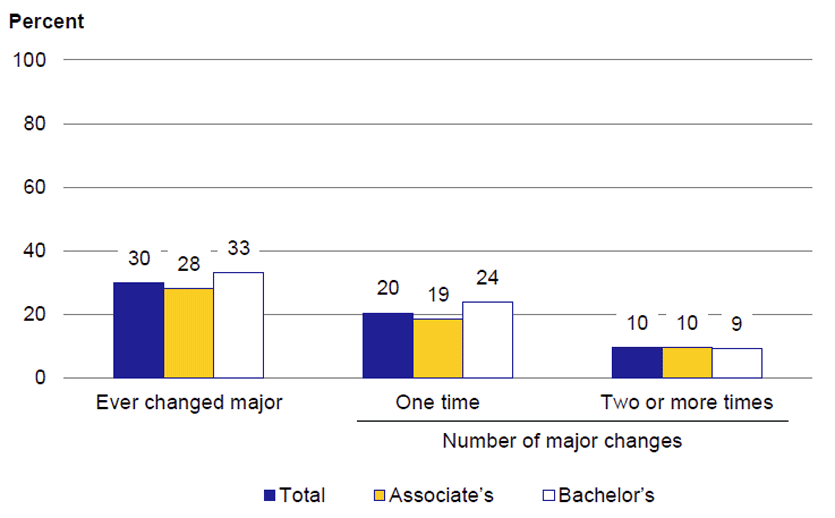Making a decision to change college majors can be difficult. You may feel uncertain about your choice or question if you are making the right decision. Before making any decisions, it is essential to consider all the implications of changing your major.
This blog post will explore the 5 questions you should ask yourself before changing majors. These questions will help you to evaluate all aspects of making a change, including financial implications, graduation date issues, and whether or not the change is indicative of a deeper issue.
What is the Cost of Changing Majors?
Arguably the most critical consideration a student should make when deciding to change majors is the financial implications of the decision. Making a decision to change your major can come with many costs.
The cost of switching majors can range from a few hundred to a few thousand dollars. Several factors contribute to the cost of changing majors, including the number of required courses, the price of tuition, and whether or not you will need to take out additional student loans.

Changing majors produces unintended costs associated with adding extra time due to the major change and the need to fulfill other general education requirements. If you had college credit from high school, then your
One of the most apparent expenses is the cost of changing your classes. Suppose you have already taken some courses in your current major. You will likely have to pay to switch to a new major and take the corresponding classes.
In addition to paying for classes, you may also have to pay for books, lab fees, and other associated costs with your new major.
If your major change is more expensive, you may also need to consider how this will impact your future finances. You may need to take out student loans or work more hours to cover the extra costs.
Pay Attention High School Students
It is essential to weigh these costs before deciding to change your major. If you are currently in high school or in your senior year of high school, you should consider whether or not one school is better than the other and speak with the academic advisors at the institution you want to attend.
Speaking with experts in the transfer process can open a new path to soliciting more advice and solidifying your comfort with your major choice and the requirements needed for your future career goals.
Remember, graduating with more debt will ultimately limit your choices more than a new major can expand them. As such, you should carefully consider whether switching majors is worth the cost, especially if it brings you more into debt.
Will Changing Majors Affect Your Graduation Date?
If you are considering changing your major, one of the most important things to consider is how it will affect your graduation date.
When you initially enrolled in college, you likely estimated how long it would take you to graduate based on your selected major. If you switch to a new major, your graduation date may be pushed back.

This can be especially true if your new major requires more credits than your original major. Suppose you are confident that you want to obtain a bachelor’s degree. In that case, it is best to check to ensure that the course material is similar and will transfer over correctly.
It is essential to consider how changing your major will impact your graduation date and whether or not you are willing to extend your time in college.
Related: When do UC Decisions Come Out? Announcing 2023 UC Decision Dates
Remember, you will likely have to pay for additional semesters of tuition, fees, and other associated costs if you do not graduate on time.
As such, you should carefully consider whether or not you can afford to extend your college career before deciding to change majors. The additional course work required to switch majors can scare many of us but could be a good idea if done correctly.
Why am I switching majors?
When deciding to change your major, it is essential to consider why you are making the change. Is it due to career goals you cannot fulfill in your current predicament?
One of the reasons may be that you are finding the classes in your current major too difficult.
It is important to remember that switching majors does not mean you have to give up on your goals. Many college students have switched to a different major and still gone on to successful careers. You can change your major as long as you understand the repercussions of doing so. Of course, this does not mean you should stick with a major you’re no longer interested in. You should immediately change your major if you feel unmotivated to attend school because of your chosen path.
In fact, according to the National Center for Education Statistics,
“Within 3 years of initial enrollment, about 30 percent of undergraduates in associate’s and bachelor’s degree programs who had declared a major had changed their major at least once”
U.S. Department of Education, National Center for Education Statistics, 2012/14 Beginning Postsecondary Students Longitudinal Study (BPS:12/14)

If you find the classes in your major too difficult, there are a few things you can do to overcome this challenge.
- First, talk to your professors. They can often provide additional resources or guidance to help you succeed in your classes.
- Second, seek out help from tutors or study groups. Many students on campus are often willing to help each other succeed.
- Third, ensure that you take advantage of all your school’s resources. This may include counseling services, academic support centers, or tutoring services.
- Finally, don’t be afraid to ask for help when needed. Many people on campus want to see you succeed and will be happy to help you in any way possible.
Do I feel unsure about my future?
The process of choosing or changing a college major is fraught with uncertainty. For many college students, the decision comes down to whether they will feel fulfilled by their chosen field of study.
This sense of fulfillment is often dictated by external factors such as job scarcity or the availability of opportunities in other areas. In some cases, students may change majors due to the self-realization that they have the talent to succeed in another field or discipline.
How Many Students Actually Change Majors?
To put uncertainty into perspective, a recent study found that,

“About half (52 percent) of students whose original declared major was mathematics switched majors within 3 years. Mathematics majors change majors at a rate higher than students in all other fields, both STEM and non-STEM.”
These statistics show that people majoring in Computer Science or Mathematics are much more likely to switch majors due to the rigor of coursework, loss of interest, or the student realization that they are better suited in another field or discipline.
The contemporary landscape of higher education is such that students must weigh these factors carefully before deciding on their future. Change your major if you struggle in classes so that you are not dealing with a series of “F” grade marks on your transcript.
Your Major is What Interests You
A major should be more than just a list of required courses; it should reflect the student’s interests, values, and skills. For students, choosing a major can feel like a make-or-break decision. It is not uncommon for students to change their majors multiple times before settling on one that feels right.
A major should lead to a career that is both challenging and rewarding. It is also essential to consider the job market and whether or not there will be opportunities available in the field after graduation.
Ultimately, the goal is to find an academically and emotionally fulfilling major. With so much at stake, it is no wonder that students often feel overwhelmed when choosing a college major.
Consider speaking with the Career Center at your institution to seek other career paths and gain insight into the work environment and job market of the major you want to switch.
Can I add a double major or a minor instead?
If you feel unsure about your major, you may consider adding a double major or a minor. This can help you to explore a different major or minor and see which one you are most interested in. Double majors are effective because it does not deviate from the degree path they were headed down. Instead, it may adding time that colleges and universities benefit from with more money.
Suppose you are close to finishing the requirements for your current major. In this case, it might be best to add a minor or consider double majoring in another field. You do not want to lose credits for the courses you have already taken, and other majors may require other subjects to be completed to fulfill the requirements for a Bachelor’s degree.
Although it may affect when you graduate, it could open up a wide variety of graduate school or career possibilities. Adding a double major or a minor can also help you to stay on track for graduation.
Make Sure You Can Handle the Increased Workload
It is crucial to weigh the costs and benefits of adding another major or minor before deciding. Make sure that you can handle the increased workload and that you have enough time to complete all of the required courses.
If you decide to add a double major or a minor, talk to your academic advisor about the best way to proceed.
Conclusion
Changing your major can come with several costs, including delaying graduation and losing credits. Before making any decisions, weighing the pros and cons of changing your major is crucial.
If you feel unsure about your future or don’t feel fulfilled by your current major, consider adding a double major or a minor instead. This can help you to explore different fields and see which one you are most interested in. Talk to your academic advisor about the best way to proceed.
Ultimately, the goal is to find an academically and emotionally fulfilling major. With so much at stake, it is no wonder that college students often feel overwhelmed when choosing a college major. But by asking yourself some critical questions, you can make sure that you are making the best decision for your future.





